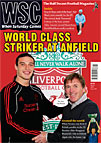 An internatioanlly renowned midfielder who failed to live up to the hype but became a cult hero anyway. Damian Hall tells a heart-warming tale
An internatioanlly renowned midfielder who failed to live up to the hype but became a cult hero anyway. Damian Hall tells a heart-warming tale
Reputations, it is said, take ages to build but can be destroyed in an instant. This adage, though probably quite apt generally, is not at all true of John Jensen. He earned a reputation very quickly and lost it in a painfully slow, grinding kind of manner.
England fans first learned his name when he hit Chris Woods’ post, when the central midfielder probably should have scored (Arsenal fans should maybe have noted that bit down), in the 0-0 draw with Denmark in the 1992 European Championship. The rest of Europe knew his name two weeks later when he smashed a glorious screamer past German keeper Bodo Illgner in the final, to earn the Danes an unlikely trophy. Arsenal manager George Graham snapped him up.
There were no “John who’s?” around Highbury, oh no, we all knew we had signed a goalscoring midfielder of international pedigree. How could it be otherwise? We’d seen it on the telly and the telly doesn’t lie. The signing of “Faxe” was enough to have Alan Hansen tipping us for the 1992-93 title. Jensen’s nickname, rather than referring to an unhealthy obsession with telecommunications apparatus, was thought to be Danish for axe – wrongly, as it turns out. As that’s not a normal sobriquet for a goal-getter perhaps, again, we should have read the signs. (It turns out Faxe is a popular Danish beer, though Jensen was never a party animal either.) Arsenal’s midfield was pedestrian, and we blindly believed our wait for a playmaking genius was over. I was thinking David Platt with a sprinkle of Michel Platini. And we, quite reasonably, expected a few goals. Not 15, or even ten, but surely four wouldn’t be too much to ask. Three would be fine really.
Now the 1987 Danish Player of the Year could tackle and he would run all day, albeit not very fast. And he could pass OK, albeit it mostly sideways. But he couldn’t shoot to save his life. His better efforts worried the Clock End clock. At first we assumed it was eager-to-impress nerves, but it slowly dawned on us that he just wasn’t very good, and a bit worse than not very good when he got anywhere near the penalty area.
“I got a shock when I realised what the fans were expecting when I joined,” Jensen said a few years later. “The harder I tried to score, the worse it got. Every time I gathered the ball the cry would go up ‘shoot, shoot, shoot’. It was crazy.” A goalless season passed. Then another. The fans teased him with growing fondness. They sang “I’ll be there when Jensen scores” (also available as a T-shirt) and then “I’ll be dead when Jensen scores”. How could you not warm to him? He was like a little bird with only one wing desperately trying to fly. And the longer the famine went on, the greater a post-modern hero the bubble-permed Dane became.
And then, finally, when most had given up hoping, it happened. On New Year’s Eve 1994, in his 99th league game, he did it. A beautiful, curling, pass-shot into the top corner, from just outside the area. A complete aberration. Oh my word. We celebrated as if no one had ever scored at Highbury before. “I will never forget the noise when I finally did score,” recalls Faxe. “The cheering just went on and on.” All we wanted was a two-yard tap-in and he’d rewarded our patience with solitary moment of genius.
The fact that QPR scored three to Arsenal’s one didn’t bother anyone unduly. “They were coming up to me later, mobbing me, showing me their T-shirts… I dedicated my goal to Arsenal and all those fans who, in the end, made me feel so wanted and made my time, in a strange sort of way, so enjoyable,” he said. It was strange after that. We, and perhaps he, knew he wasn’t good enough for a title-challenging side. And then there was all that horribly messy business about bungs, which cost Graham his job and brought an unedifying chapter to an otherwise rather lovely story about someone who was loved for their inadequacies.
It was beginning to feel like the morning after a one-night stand, when one participant hangs around too long. New manager Bruce Rioch did the charitable thing in sending him back to Denmark. “Even after I left,” says Jensen, “I kept getting messages of support, telling me they would never forget me. It felt strange to be such a phenomenon when, really, I had failed them in their expectations of me.” His final stats read 139 appearances – one goal.
From WSC 289 March 2011